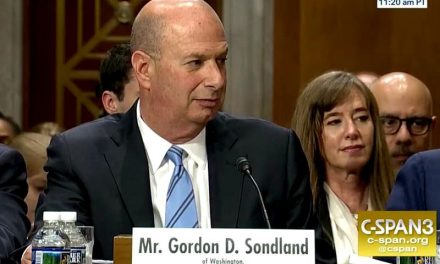When people complained about ISIS using the Twitter platform to share beheading videos, the corporation figured out how to solve the problem. Their approach was heavily reliant on blunt-force algorithms that auto-banned a lot of legitimate accounts, including some from groups who were acting as ISIS watchdogs. This is widely seen as an acceptable tradeoff, but many people are wondering why Twitter can’t do the same thing to eradicate white nationalist hate speech. It turns out that the reason the algorithm approach cannot be applied to white nationalists is that it would auto-ban a lot of Republicans, including some officeholders, and that would make it politically divisive.
At a Twitter all-hands meeting on March 22, an employee asked a blunt question: Twitter has largely eradicated Islamic State propaganda off its platform. Why can’t it do the same for white supremacist content?
An executive responded by explaining that Twitter follows the law, and a technical employee who works on machine learning and artificial intelligence issues went up to the mic to add some context…
…With every sort of content filter, there is a tradeoff, he explained. When a platform aggressively enforces against ISIS content, for instance, it can also flag innocent accounts as well, such as Arabic language broadcasters. Society, in general, accepts the benefit of banning ISIS for inconveniencing some others, he said.
In separate discussions verified by Motherboard, that employee said Twitter hasn’t taken the same aggressive approach to white supremacist content because the collateral accounts that are impacted can, in some instances, be Republican politicians.
One common response to this revelation is to point to the GOP and say, “See, look how racist they are!” But I’d like to focus on something related but different. We hear people theorize all the time that Trump’s racism has given people permission to voice their own racist thoughts, and even inspired acts of racial or religious violence. It’s hard to measure something like that, just as it’s hard to know how many violent acts are inspired by portrayals of violence in media or video games.
In this case, we have something tangible that we can explore. The difficulty of banning white nationalist hate rhetoric from Twitter stems directly from the fact that it would be politically divisive and therefore problematic for the company. The divisiveness doesn’t primarily derive from limitations on free speech. While some people are obviously sympathetic to the ideology and actions of ISIS, the number is too small to create a significant backlash when their content is banned. Likewise, relatively few people are supportive of Nazis and Klansmen, and their content would not be missed if it were suddenly absent. The divisiveness in this case arises from the fact that the subjects of the ban have political power.
Any move that could be perceived as being anti-Republican is likely to stir backlash against the company, which has been criticized by President Trump and other prominent Republicans for having an “anti-conservative bias.”
What this means is that everyone is subjected to hate speech on Twitter solely because there are Republicans who engage in hate speech.
So, while we can consider Trump’s influence on the rise of racist speech to be theoretical, we don’t need to be in any doubt about whether the party as whole is responsible for the visibility of hate speech. This establishes a solid line of responsibility.
It shows how having leaders engage in racist rhetoric winds up permeating everything with the result that racism is more socially acceptable. This isn’t some sociological conundrum or difficult question of causality of the kind we grapple with when he look at violence on television. A major social media corporation feels compelled to allow white supremacists to operate on their platform because of the actions and attitudes of Republican Party officeholders.
This is another example of why leadership is so important. It’s not just how leaders speak that is important. In some cases, it is devastating that that they’re saying something at all.







